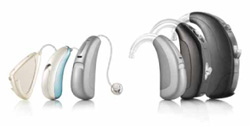Audiology is a specialty which evaluates and treats hearing and balance disorders. Our Doctors of Audiology have the level of expertise to provide thorough, quality care to our patients. Our certified audiometric technicians provide additional support to patients when needed.
How do I Know if I Have a Hearing Loss?
Common Signs of Hearing Loss
It is always a good idea to practice hearing loss prevention techniques, but hearing loss can still sneak up on you. If you experience any of the below signs, you should see a hearing specialist.
- Difficulty hearing on the telephone
- Trouble hearing birds, wind, alarms/bells, women and children
- Turning the TV volume too high for others
- Frequently asking people to repeat themselves
- Trouble hearing words or music when there is background noise
- Difficulty following conversations in groups
- Feeling that many people mumble
- Misunderstanding words and responding inappropriately, or nodding/smiling when you haven’t really understood what was said
- Frequent ringing, roaring or hissing in the ears
How Do I Prevent Hearing Loss?
Preventing Hearing Loss
Even though some hearing loss is unavoidable as it comes with time and age, there is plenty you can do to help protect your ears:
- Avoid prolonged noise exposure.
- Wear earplugs during loud activities like lawn mowing, concerts, hunting, construction, etc.
- Be careful with headphone volume. If possible, use noise-reducing headphones
- Ask your doctor if any of your medications could be ototoxic (damaging to hearing)
- Especially if you are over the age of 50, schedule a yearly hearing test.
What’s That Noise in My Ears?
Tinnitus is an abnormal perception of sound reported by patients when no sound source is present. It can be described as a ringing, roaring, rushing, hissing, buzzing or humming sound.
What Happens During a Hearing Test?
Hearing evaluations are used to differentiate patients who have auditory problems related to medical conditions versus those disorders that result solely in communication impairments. These are diagnostic medical tests, usually covered by health insurance, and are conducted only by audiologists. Diagnostic audiometric tests should not be confused with the “free” hearing tests that other facilities use as a sales tool to generate office traffic for hearing aid fittings.
About Hearing Loss
Our hearing is at work for us 24 hours a day; whether we are talking to loved ones, listening to the radio, watching TV, or interacting with peers on the job. Effective communication through hearing is a vital part of living.
Untreated hearing loss can be frustrating and isolating. According to a study by the National Council on Aging, people with untreated hearing loss were more likely to report depression and anxiety, and participate less in social activities than those who wear hearing aids.
Although hearing problems are typically associated with the normal aging process, more than half of all hearing impaired persons are under the age of sixty-five.
At ENT Head & Neck Specialists we strive to give each patient the individualized hearing health care that will most improve his or her quality of life.


